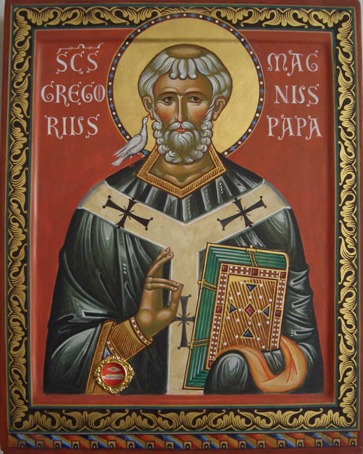
Wisely governing the Church, Hierarch Gregory tirelessly planted the Word of God. Saint Gregory compiled in the Latin tongue the order of the Liturgy of the Presanctified Gifts (used during Great Lent), which before him was known only in oral tradition. Confirmed by the Sixth Ecumenical Council, this order was accepted by the whole Orthodox Church.
He zealously struggled with the heresy of the Donatists,[1] and converted to the true faith the pagan inhabitants of Britain and the Goths, who were adherents of the Arian heresy.[2]
Hierarch Gregory left behind him numerous works. After the appearance of his book, Conversations or Dialogues on the Life and Miracles of the Italian Fathers, (otherwise known as The Dialogues) the hierarch began to be called the "Dialogist", that is "one conducting a dialogue, a collocutor". His "Pastoral Rule" (or "On Pastoral Ministry") enjoys special renown. In this work, Hierarch Gregory thoroughly describes the image of the true pastor. Also, 848 of his letters of moral content have come down to us.
Hierarch Gregory headed the Roman Church in the course of thirteen years, taking care of all the needs of his flock. He was distinguished by an unusual love for the poor, for which he was vouchsafed a vision of the Lord Himself.
The Hierarch died in the year 604. His relics rest in the Cathedral of the Holy Apostle Peter in the Vatican.

